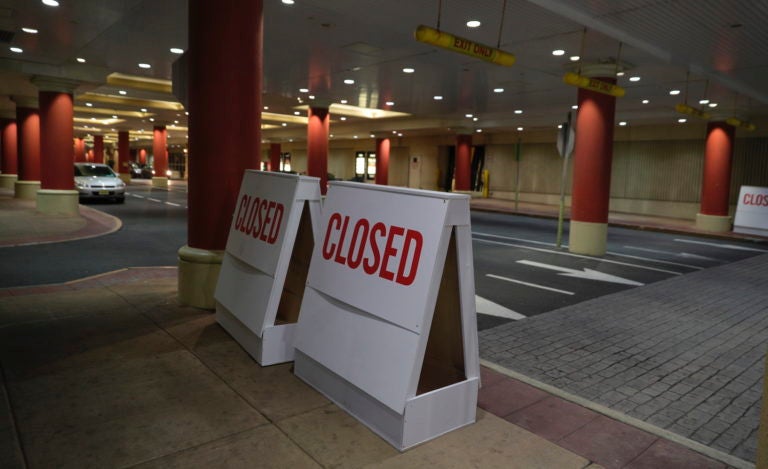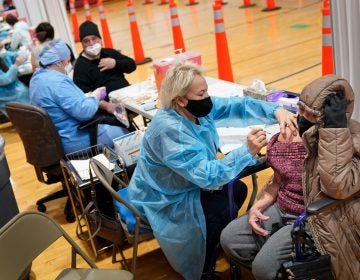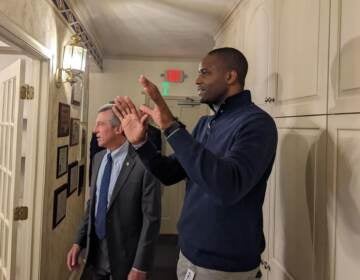Here’s how Pennsylvania, New Jersey and Delaware say they’re helping laid off workers
As the coronavirus pandemic puts thousands of people out of work, state and federal governments are finding ways to help them survive.

(Edward Lea/The Press of Atlantic City via AP)
Jeeva Muhil lost her job on Monday.
The 24-year-old has spent the past three years working as a bartender at Noobar, a restaurant in Terminal B of Philadelphia International Airport.
The restaurant is one of many in the airport owned by OTD, which contracts with American Airlines. Muhil made $6.00 per hour, and said she had been looking forward to warmer weather, when more people travel and tips improve.
But, she said, that changed Monday and Tuesday, when the layoffs started. Muhil and most other OTD workers have now lost their benefits, aren’t getting any severance and can’t get compensated for paid time off they had not used.
“Conservatively, 70 to 80% of us are out of work,” Muhil said. “Tuesday was pretty much about us all applying for unemployment.”
She’s not sure when she might have her job back. Her managers are telling her they might rehire service workers in July or August.
“It’s been really chaotic,” she said. “I’ve been really trying to figure out how my bills are going to be paid, and I know i’m one of the fortunate ones — unlike most of my coworkers, I don’t have any kids and I’m not supporting anyone.”
Airline workers aren’t the only people feeling the coronavirus strain. Small businesses are quickly shutting down under new statewide measures aimed at stemming the spread of the illness, and bars and restaurants are transitioning to take-out and delivery-only operations. And all the while, unemployment is skyrocketing.
Federal help may be on the way. On Wednesday, the U.S. Senate passed what is expected to be the first of several bills designed to offer some relief from the economic slowdown.
It would require businesses with fewer than 500 employees to give those workers two weeks of paid sick leave, boost funding for food assistance programs and augment existing unemployment insurance. It would also guarantee free coronavirus testing.
President Donald Trump is expected to sign it. He and other lawmakers are reportedly also working on a broader stimulus package that could include aid to hard-hit industries and checks for individual taxpayers.
Trump has also issued an executive order halting foreclosure for homeowners with federally-backed mortgages, and stopping evictions from public housing for people affected by coronavirus.
But in the meantime, states are working on their own plans — from unilateral action by governors, to bills being quickly thrown together in state legislatures.
Pennsylvania
As of Wednesday afternoon, Pennsylvanaia’s Department of Labor and Industry estimated around 121,000 people had applied online for unemployment compensation. In comparison, the Associated Press reported that the state got just 12,000 claims in the entire first week of March.
The commonwealth has made a few concrete changes to deal with the influx.
Labor and Industry waived two of the requirements that people applying for unemployment compensation usually have to follow. Claimants no longer have to prove they have applied for or searched for new jobs in order to keep their benefits, and they’re not required to register with Pennsylvania’s work search database.
Plus, the government has axed customary week that claimants have to wait before benefits kick in, meaning benefits can begin immediately after claims are approved.
The department notes that even people who have had hours reduced, but haven’t completely lost their jobs might qualify for benefits. It didn’t specify what the requirements for part-time benefits might be, or whether they had changed, but urged affected workers to file an initial claim.
The commonwealth has also made some changes that apply to businesses. Chiefly, any business that is temporarily closed due to coronavirus will be exempt from the tax rate increases that would usually accompany its employees filing for unemployment compensation.
A spokeswoman for Gov. Tom Wolf didn’t say what other changes might be coming.
However, in a statement, the governor said, “As a businessman and a father, I understand the tremendous worry to put food on the table. My administration is already pursuing every channel to support Pennsylvanians who have lost their income from this disaster.”
Lawmakers are beginning to mull possible legislative actions, too.
They’re circulating proposals for bills that would suspend collection of sales and income tax during the governor’s emergency declaration, extend the tax filing deadline, allow certain business owners to collect unemployment and expand the Family Medical Leave Act.
New Jersey
The Department of Labor and Workforce Development in New Jersey is assuring people laid off for coronavirus-related reasons that they already have options under state law.
Unlike some states, New Jersey’s earned sick leave, temporary disability and family leave insurance laws cover full-time, part-time, temporary and seasonal workers.
They also cover public health emergencies which, according to the state, means “employees can use earned sick leave if their workplace or child’s school or daycare is closed due to an epidemic, or if a public health authority determines the need for a quarantine.”
The state also says it’s banking on the relief package expected to pass the federal government — in particular, the promise of 100% compensation for small- and mid-sized businesses that provide two weeks of sick leave to employees, plus additional tax credits for providing paid family leave.
It’s also encouraging out-of-work people to apply for unemployment.
A notice to business owners on the Labor and Workforce Department’s website urges them to “pay your workers whether or not they are able to work,” adding that “all but the largest employers will be fully reimbursed under the legislation, and employees who are not well or are caring for someone who is ill will have the peace of mind and financial security to stay home.”
The New Jersey Economic Development Authority is also waiving some of the requirements for certain state grants that, under normal circumstances, require a certain number of employees to be at work.
The Labor Department also notes it’s planning to roll out new measures to help businesses, but they aren’t ready yet.
“Several state agencies are currently engaging with local business leaders, local financial institutions, and business advocacy groups to better understand what supports would be most impactful to ensure business and employment continuity,” it said in a PSA to business owners..
Concerned business owners can call the New Jersey Business Action Center or visit its website.
Delaware
Delaware workers who lose their jobs as a result of coronavirus and the state of emergency it has caused can now get some new help from the Department of Labor.
Typically, workers cannot receive unemployment checks if they are working even in a part time job.
New guidance from Gov. John Carney has changed that to allow workers to still collect unemployment as they work part-time. To qualify, workers must be able to demonstrate that they have decreased hours and earnings.
The move is aimed to help workers especially in Delaware’s restaurant and hospitality industry.
“Restaurants, bars, hotels, and other hospitality-related businesses, and their workers, are among those most seriously impacted by the coronavirus in Delaware,” Carney said. “Many people from other states have postponed non-essential travel, meaning they are not coming to Delaware for vacations or business. We feel it is crucial that the state step in to assist these businesses and their employees.”
The state is also working to rapidly process unemployment claims with the goal of making benefits available within a week. Earlier this week, the Department of Labor announced that workers ordered to be quarantined by a doctor are eligible for unemployment funds. The same goes for parents or guardians who are forced to quit or take unpaid leave to care for children as a result of Carney’s decision to close schools for two weeks.
The state is also offering no-interest loans to small businesses in the hospitality industry. The Hospitality Emergency Loan Program will offer no-interest loans to cover rent, utilities and other unavoidable bills. The money cannot be used for personnel costs. The loans have a 10-year term with payments deferred for nine months. To qualify, businesses must show that they are up to date on 80% of their payments over the past 12 months. They cannot be past due on any bill for which it is replying for relief.
The state is still waiting for approval from the U.S. Small Business Administration to help small businesses and nonprofits meet payroll. The state applied for SBA to make low-interest loans of up to $2 million per business available to companies and nonprofits that have suffered economically. That money could be used to pay employees or other bills.
WHYY’s Mark Eichmann contributed reporting.
WHYY is your source for fact-based, in-depth journalism and information. As a nonprofit organization, we rely on financial support from readers like you. Please give today.





![CoronavirusPandemic_1024x512[1]](https://whyy.org/wp-content/uploads/2020/03/CoronavirusPandemic_1024x5121-300x150.jpg)


